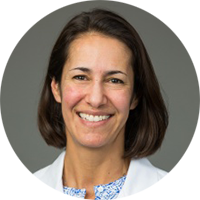
Mary E. Klotman, MD, Dean of the Duke School of Medicine, is known as a “quadruple Dukie.” She attended Duke for medical school, internal medicine residency, and infectious diseases fellowship. After fellowship, she joined the Duke faculty as an Assistant Professor. In 1987 she joined the National Institutes of Health, working in the Laboratory of Tumor Cell Biology under Robert C. Gallo, MD. Dr. Klotman later transitioned to Mt. Sinai School of Medicine where she served as Chief of the Division of Infectious Diseases for 14 years. In 2010, Dr. Klotman returned to Duke as Chair of the Department of Medicine. She was then selected for the role of Dean in 2017. In this interview, we discuss her path to the Dean role and her insights on being a woman leader in medicine. The interview was conducted by Daniella Zipkin, MD, Associate Professor of Medicine (General Internal Medicine) and Chair for the Program of Women in Internal Medicine (PWIM).
Zipkin: Approximately 18% of U.S. medical schools have the privilege of having female deans. Factors contributing to this low number, which have been cited in the literature, include lack of mentorship, lack of role models, implicit bias (not envisioning women as leaders), and family obligations. Can you share the key milestones along your own path to the Dean role? Which moments and opportunities stand out as most impactful? Which skills proved the most valuable in the process?
Klotman: The initial opportunity was actually unexpected. When I transitioned from NIH to Mt. Sinai in New York, I was setting up my lab, and not thinking much about formal leadership roles. I thought of myself as a less traditional candidate since I wasn’t marching through in a straight path in academia as a result of the time I spent at the NIH. However, shortly after I arrived at Mt. Sinai, the division chief for Infectious Diseases had to step down. The Chair of Medicine, Barry S. Coller, MD, asked me to take the role. Barry has been a lifelong mentor and sponsor, and I trusted his judgement, so I took it! Even though I hadn’t considered that role at that time, I had confidence in myself and the strong support of my Chair.
With many leadership roles, you learn on the job. My Chair did send me early on to the Executive Leadership in Academic Medicine program at Drexel. Many women leaders have gone through that program, so it does offer structured training. But most is on the job. Financial crises created situations where I had to learn to represent the division’s finances in a certain way. There was also a lot of other crisis management – we went through 9/11, a bed tower fire, a blackout. Cultural issues also posed challenges. Mt. Sinai was progressive around social issues and HIV care, but also very traditional around gender expectations in medicine. Many junior faculty were women, and it became clear that I needed to look at equity through a new lens. Things like who gets time off on weekends and holidays (especially the Jewish holidays; that’s a big thing in New York!) created tension and some blowback from more senior male faculty. But I got through those challenges by holding firm to the goal of fairness and being explicit about my reasoning. Also, in a leadership role, you have to accept that not everyone will be happy with your decisions.
When I took the role of division chief, I had two young kids. I stayed on as division chief for a very long time, 14 years, because my family life took precedence. Nothing was going to disrupt my time with my kids. I didn’t consider a move until my youngest was in college. That was the easiest decision to make, it gave such great joy! I really wanted to be present and not disrupt their lives for my career.
Although I don’t have solid data, it seems that women choose to stay put for longer than men do, on average. Nowadays, in my role in engaging and interviewing candidates for leadership positions, I see women mentioning family more often than men, whether that be young children or aging parents. Over the course of several chief and Chair searches, a number of women candidates say “no” because they are just not willing to move. Women seem to make these decisions more intentionally.
Zipkin: Being the devil’s advocate – does this put some of the onus for the disparities in women’s opportunities and lower compensation back on women faculty? I’ll be honest, the perception of our parenting roles as a barrier to success has always bothered me, because we also have data indicating that disparities exist for women even when controlling for parental status.
Klotman: No – the carrots just weren’t there before for women faculty! We didn’t tailor the opportunities for what women wanted. Also – in my experience women are less likely to ask for things that might make their lives easier. Asking for travel support, housing benefits, etc. – women don’t think to ask. Women tend to focus on the job and whether they are qualified.
Zipkin: What skills do you have that make you as powerful as all the men in the room?
Klotman: Building key alliances is critical. Barry Coller has always been a key support and advocate, everyone should have someone like that! His strong support gave me confidence when I had to make hard decisions. I also had an opportunity at Duke, having Nancy C. Andrews, MD, PhD, as a mentor, role model and leader. Nancy gave me the chance to be Chair at Duke.
At the NIH in Bob Gallo’s lab, it was a chaotic environment, and I became a trusted voice. Being steady in the midst of chaos and being prepared with data is what I bring to the table.
Zipkin: Was there a time in your career where you perceived that either getting selected or not getting selected for a leadership role was impacted by your gender?
Klotman: Now I’m on the list! Once you’re on the list it seems like “everybody wants women.” I have been asked to look at jobs frequently, and occasionally I have put my name in for high level roles. At the same time, I’m more aware of gender bias now than ever before. It happens in subtle ways. On one of these occasions, at the end of an interview for a role at a different institution, I got the comment “Well, your husband is in another city… The perception of that… one might think you’re not totally committed”. People were thinking I wasn’t serious about the role since my husband wasn’t going to be living in the same city. No one would question a man’s decision about living long distance in the same scenario.
Zipkin: What words of wisdom would you share with women trainees and faculty who are seeking out leadership opportunities?
Klotman: Don’t over analyze it, just go for it! Women sometimes think things through to the point where we DON’T step forward. We say, “what’s the job and can I do it?” but we talk ourselves out of it. Stretch and go for it! As long as you’re comfortable with where you are in life. Balancing family is still key. But women shouldn’t focus on why they can’t do things.
Women aren’t out there as much for roles at the highest levels. Until very recently, there simply were not as many women eligible for the high level roles yet, it is somewhat generational. We have to continue to work on developing the pool of women, the pipeline.
Zipkin: What recommendations would you give male leaders in the school of medicine regarding supporting equity of opportunity for women and underrepresented faculty?
Klotman: Informed male leaders know that women are the essential to their success. The diversity bonus is real. I was just called by a top institution regarding search for a Chair of Medicine. They were laser focused on women and URiM candidates. There is a sea change going on. I get called for every leadership job, and they are always looking for a diverse pool of candidates. So, again, you have to do the work to develop women and make sure the pool is big. Male leaders must support the career development of their talented women faculty and staff, help emerging women leaders get more experience. It’s not as purposeful as it should be. It is going to take a generation of male leaders at that level to develop the talent.
Zipkin: I’d like to ask a broader question about the school and our faculty. Representation of women and people of color on hiring and promotions committees has been shown to reduce inequity in their outcomes. Can we strive for greater diversity of representation at Duke?
Klotman: This came up in the work the faculty working group on DEI strategic planning, it’s critical. Whether it’s APT or distinguished professorships or named lectureships, the highest promotions and honors--if you have restrictions like that (including professor level only on the committee, etc.), you won’t move the needle that fast. We are working on what how we can do change our policies to enhance diversity. Some of it might be changing the fundamental rules. Some of these policies need to be completely re-wired. We are going to step up and get it done!
